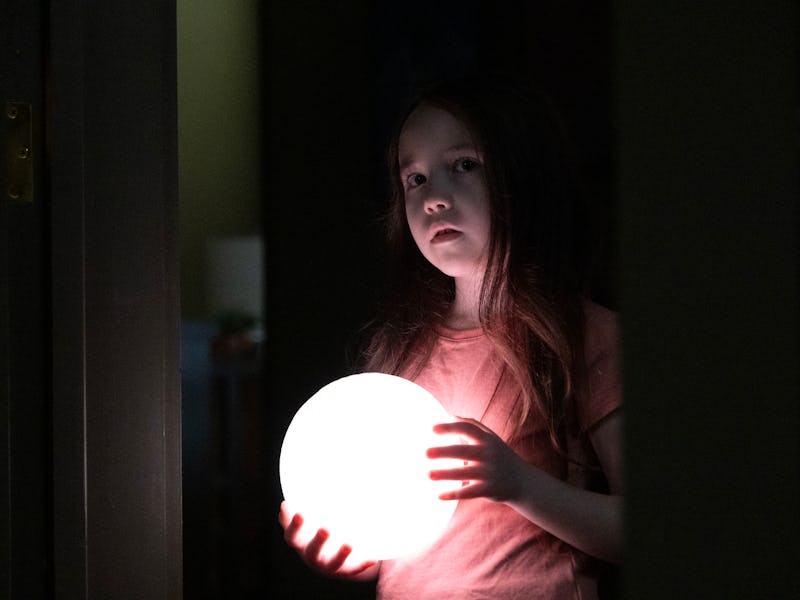In Defense of the Solidly Constructed Jump Scare
The Boogeyman, an adaptation of the Stephen King short story, is a testament to an effective jump scare.

It’s one of our primal fears reaching back to childhood: when things go bump in the night. But how many times can a mysterious bump, a muffled thud, or a creepy face peeking through the shadows really keep us scared? The Boogeyman, Rob Savage’s adaptation of the 1973 Stephen King short story of the same name, tests that theory. And through the course of its jump-scare-packed runtime, it proves that it can keep you — if not in a perpetual state of fear — pretty scared for a good 99 minutes.
The Boogeyman opens with a horrifying scene. A screaming infant sees something creep out from the closet in its bedroom, before the camera pans to a picture of a happy family, soon splattered with blood. This shocking death (which happens just offscreen) appears to set the tone for the rest of the movie. Will it be full of horrifying child deaths and bursts of gruesome violence? Not quite, the rest of the movie is a fairly bloodless affair. But by playing its hand early, The Boogeyman does something smart: it keeps you on edge so that every jump scare and every peek around a particularly dark corner feels like an anxiety attack waiting to happen.
Chris Messina is slightly underused in the role of the grieving father.
After its first gruesome death, The Boogeyman dramatically pivots, picking up with teen Sadie Harper (Yellowjackets breakout Sophie Thatcher), her little sister Sawyer (baby Leia herself, Vivien Lyra Blair), and her grieving father Will (Chris Messina). The family is reeling after Sadie and Sawyer’s mom died suddenly in a car accident, but they soldier on. Sadie returns to school only to be met with pitied stares and mocking snickers, while Will grimly continues taking patients in his home office.
But one new patient throws the Harpers’ fragile harmony off-kilter. Lester Billings (David Dastmalchian, perfectly chilling in his brief screentime), the father of the infant in the opening scene, arrives at Will’s office, begging for him to listen to his story. What he tells is something too horrifying to believe: that a creature he calls the boogeyman killed all of his children, one by one. Concerned by what he believes to be unstable ravings, Will calls the police, only for Sadie to return home and discover the body of Lester Billings hanging in the closet of her mom’s old studio. But Lester’s death may have left something else in their house, which now stalks and terrorizes the family at night.
The Boogeyman struggles between being a straightforward monster movie and a “trauma horror” movie.
The Boogeyman is a testament to the well-constructed jump scare. But even more so, it’s a testament to the unique kind of dread that can build as one waits for the next jump scare, and the sudden, violent catharsis that a jump scare can inflict. It’s achieved by following the horrifying heights of that opening scene with a muted, almost slow-burning drama that slowly turns to dread. After playing his cards early on with the first death scene, Savage wisely keeps the Boogeyman at bay for most of the movie, only unveiling its creepy skeletal visage and spider-like limbs in bits and pieces.
Most of the scariest scenes revolve around Sawyer, who very early on starts to have terrifying encounters with the Boogeyman. One particularly scary sequence begins with her rolling a light-up ball down a long, dark hallway, only for something to suddenly appear behind her. It’s simple horror movie stuff, but it’s effective.
It might be because Savage switches back and forth between standard scary jump-scares and moments of genuine, honest emotion. When Sadie conducts a half-baked séance to contact her mom, she looks into the darkness and thinks she sees her mother beckoning. But when she turns on the light, it’s just an old dress. Later, a similar scene plays out with Sadie, only it’s not a phantom of her mom she sees, but the Boogeyman. It’s an interesting push-and-pull that sits at the center of The Boogeyman, which desperately wants to be a deeper “trauma horror” movie, but is most effective when it’s a straightforward monster thriller.
But there should be no shame in being a solid, straightforward monster movie. Like the myth of the boogeyman, the jump scare is just as primal and just as visceral. There doesn’t need to be any deeper meaning to things that go bump in the night, just as there doesn’t need to be any explanation for why a face suddenly emerging from the darkened corner of a closet is really, very scary.